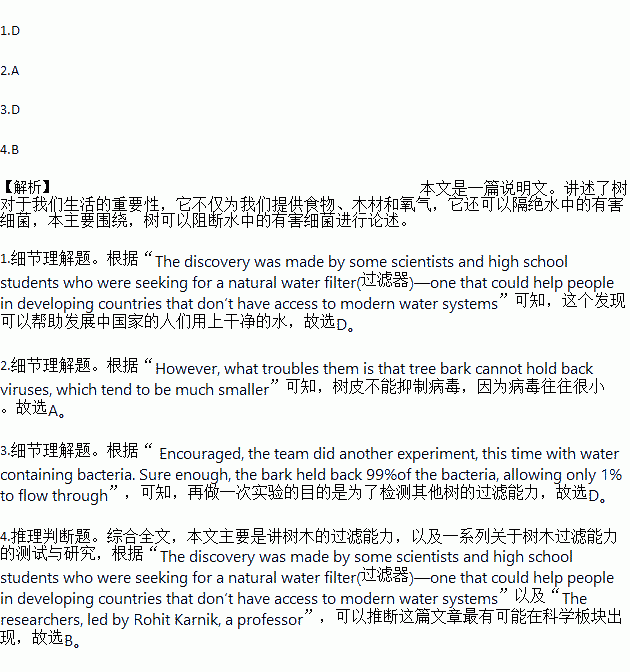题目内容
As we all know ,trees are important to our life. They provide us with food, wood and most importantly, oxygen. Now there is one more thing we can add to this list—blocking out harmful bacteria in water.
The discovery was made by some scientists and high school students who were seeking for a natural water filter(过滤器)—one that could help people in developing countries that don’t have access to modern water systems.
The researchers, led by Rohit Karnik, a professor ,decided to turn to trees for help because they were able to allow liquid to flow through while blocking out air bubbles(气泡).
They began by cutting 1.5-inch-wide sections of tree bark from the branch of a white pine tree. The researchers then tested the wood’s filtering ability by pouring water containing red dye particles(染料颗粒)of different sizes through. To their surprise, they found it was effective in trapping all the particles. Encouraged, the team did another experiment, this time with water containing bacteria. Sure enough, the bark held back 99%of the bacteria, allowing only 1% to flow through.
Mr. Karnik said the bark was able to filter water containing much smaller particles. This means that it can be used to get rid of most of the bacteria. However, what troubles them is that tree bark cannot hold back viruses, which tend to be much smaller.
Though the experiment is successful, we must remember one thing—the bark only works when damp. This means that before this natural filter can be put to practical use, the researchers will have to figure out how to keep the bark damp, or find a way to keep the bark’s great filtering ability even when it’s dry.
But the study is not done. The researchers plan on testing other types of trees, including those flowering trees. They think those may be more effective in trapping smaller particles and even viruses.
1.How will the discovery affect the world?
A. No harmful bacteria will be found in water.
B. There will be no water pollution around the world.
C. More pine trees will be planted around the world.
D. Clean water will be more accessible in developing countries.
2.What problem troubles the researchers when using the trees bark as a water filter?
A. Viruses cannot be prevented.
B. Tree bark should be wet.
C. It’s hard to remove air bubbles.
D. Not all bacteria can be held back.
3.Why does the team plan to do other experiments?
A. To find other natural water filters.
B. To improve the filtering ability of other trees.
C. To find a way to keep the bark wet.
D. To test the filtering ability of other trees.
4.In which column of a newspaper can we read this text?
A. Culture. B. Science.
C. Lifestyle. D. Society.

